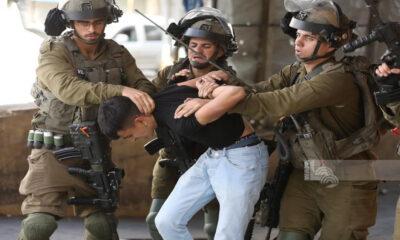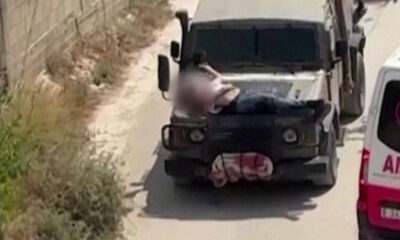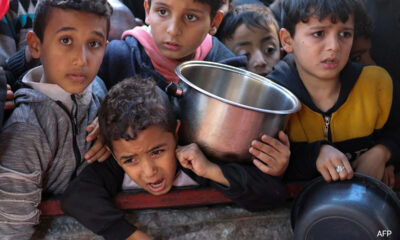International
Hospitals under fire as Israeli forces deepen operations in northern Gaza
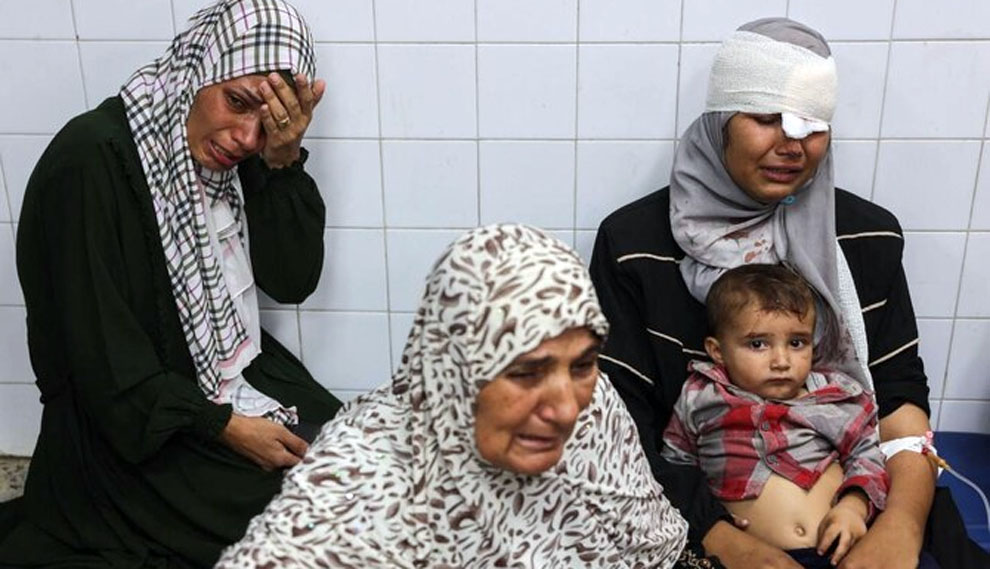
Hospitals under fire as Israeli forces deepen operations in northern Gaza
CAIRO: Israeli forces besieged hospitals and shelters for displaced people in the northern Gaza Strip on Monday as they stepped up their operations against Palestinian militants, residents and medics said.
Troops rounded up men and ordered women to leave the Jabalia historic refugee camp, they said. An Israeli airstrike on a house in Jabalia killed five people and wounded several others, medics said.
The UN Palestinian refugee agency UNRWA said Israeli authorities were preventing humanitarian missions from reaching areas in the north of the Palestinian enclave with critical supplies, including medicine and food.
“People attempting to flee are getting killed, their bodies left on the street,” UNRWA head Philippe Lazzarini said on X.
Medics at the Indonesian Hospital told Reuters that Israeli troops stormed a school and detained the men before setting it ablaze. The fire reached hospital generators and caused a power outage, they added.
Health officials said they had refused orders by the Israeli army, which started a new incursion into the territory’s north over two weeks ago, to evacuate the three hospitals in the area or leave the patients unattended.
Troops remained outside the hospital but did not enter, they said. Medics at a second hospital, Kamal Adwan, reported heavy Israeli fire near the hospital at night.
“The army is burning the schools next to the hospital, and no one can enter or leave the hospital,” said one nurse at the Indonesian Hospital, who asked not to be named.
Palestinian health officials said at least 18 people had been killed in Jabalia and eight elsewhere in Gaza in Israeli strikes.
READ ALSO:
- UN chief condemns killings of civilians in Gaza
- Dollar sells for N1,715 in parallel market
- PDP reconciliation committee to present report at NEC meeting Thursday
The Israeli military said in a statement it was operating against “terrorists and terrorist infrastructure” in the Jabalia area.
Troops had helped thousands of civilians to evacuate safely through organized routes, it said. Israel was in contact with the international community and Gaza’s health care system to ensure hospital emergency services were operating, it said.
In the past day, troops had dismantled militant infrastructure and tunnel shafts and killed fighters in the Jabalia area, it said.
Israel has intensified its campaigns both in Gaza and Lebanon after the killing of Hamas leader Yahya Sinwar last week had raised hopes of an opening for ceasefire talks to end more than a year of conflict.
It has vowed to eradicate the Hamas militants who formerly controlled Gaza and whose attack on Israel last year triggered the war, but in doing so has laid waste to much of the territory and killed tens of thousands of people. More than 1.9 million people have been left destitute and desperate for food.
“We are facing death by bombs, by thirst and hunger,” said Raed, a resident of Jabalia camp. “Jabalia is being wiped out and there is no witness to the crime, the world is blinding its eyes.”
Forced to live in toilets
Hadeel Obeid, a supervisor nurse at the Indonesian hospital, said they were running out of medical supplies, including sterile gauze and medications. The water supply has been cut off and there was no food for the fourth consecutive day, she told Reuters.
The United Nations said it had been unable to reach the three hospitals in northern Gaza.
The UN Human Rights Office accused Israeli forces of unlawful interference with humanitarian assistance and issuing orders that we causing forced displacement. It said their conduct “may be causing the destruction of the Palestinian population in Gaza’s northernmost governate through death and displacement.”
READ ALSO:
- Immigration Service explains arrest of Bobrisky
- Sacked CBN workers challenge their disengagement in court
- Lagos teacher accused of sexually abusing student, aborting pregnancies
UNRWA’S Lazzarini said injured people were lying without care in hospitals that had been hit.
“UNRWA remaining shelters are so overcrowded, some displaced people are now forced to live in the toilets,” he said.
Israel says it is getting large quantities of humanitarian supplies into Gaza with land deliveries and airdrops. It also says it has facilitated the evacuation of patients from the Kamal Adwan Hospital.
Palestinians say no aid entered northern Gaza areas where the operation is active.
Residents and medics said Israeli forces had tightened their siege on Jabalia by positioning tanks in nearby Beit Hanoun and Beit Lahiya towns and ordering residents to leave.
Israeli officials said evacuation orders were aimed at separating Hamas fighters from civilians and denied there was any systematic plan to clear out civilians. It said forces operating in northern Gaza killed scores of Hamas gunmen and dismantled infrastructure
Hamas accused Israel of carrying out acts of “genocide and ethnic cleansing” to force people to leave northern Gaza.
The Hamas armed wing said fighters attacked forces there with anti-tank rockets and mortar fire, and detonated bombs against troops inside tanks and stationed in houses.
Elsewhere in the enclave, Israeli strikes killed at least five people in Rafah in the southern Gaza Strip and four in two separate strikes in Gaza City, medics said.
The slain Sinwar was one of the masterminds of the Oct. 7, 2003, cross-border attack on Israeli communities that killed around 1,200 people, with about 253 more taken back to Gaza as hostages, according to Israeli tallies.
Israel’s subsequent war has killed more than 42,500 Palestinians, with another 10,000 uncounted dead thought to lie under the rubble, Gaza health authorities say.
Hospitals under fire as Israeli forces deepen operations in northern Gaza
ARAB NEWS
International
Israel confirms killing Safieddine, likely successor to slain Hezbollah’s Nasrallah
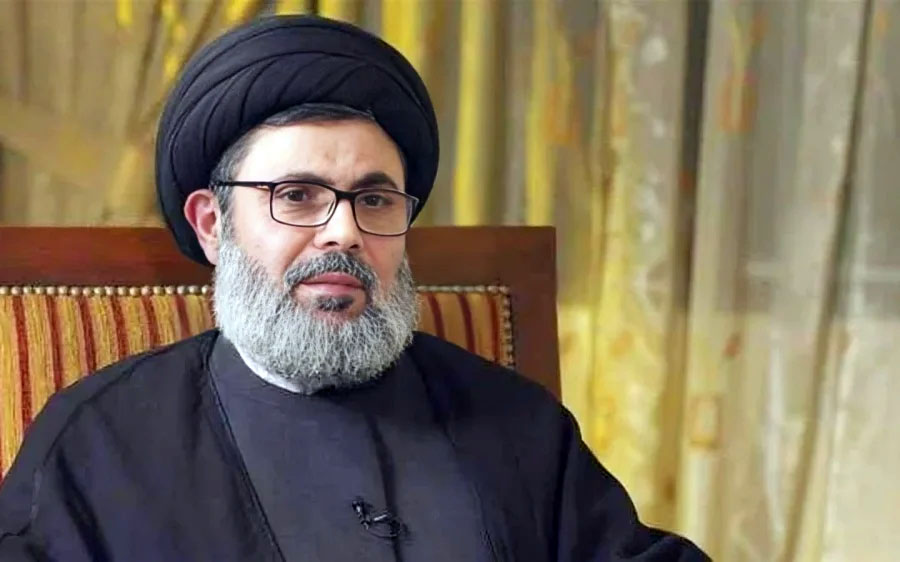
Israel confirms killing Safieddine, likely successor to slain Hezbollah’s Nasrallah
JERUSALEM: Israel’s army confirmed Tuesday it “eliminated” Hezbollah’s Hashem Safieddine, apparent successor of slain leader Hassan Nasrallah, in a strike in a southern Beirut suburb three weeks ago.
“It can now be confirmed that in an attack approximately three weeks ago, Hashem Safieddine, the head of Hezbollah’s Executive Council, and Ali Hussein Hazima, the head of Hezbollah’s Intelligence Directorate, were killed along with other Hezbollah commanders,” the army said in a statement.
Hezbollah has not yet issued a statement regarding the claim.
On October 8, Israeli Prime Minister Benjamin Netanyahu said that the military has “taken out” Safieddine, without specifically naming him.
In an address to the people of Lebanon, Netanyahu said Israeli forces “took out thousands of terrorists, including (Hezbollah leader Hassan) Nasrallah himself and Nasrallah’s replacement and the replacement of his replacement.”
Late on Tuesday, the army said that Israel’s air force “conducted a precise, intelligence-based strike on Hezbollah’s main intelligence headquarters,” in the southern Beirut suburb of Dahiyeh, Hezbollah’s stronghold in the Lebanese capital three weeks ago.
The statement added that over 25 Hezbollah militants were present in the headquarters during the strike, “including Bilal Saib Aish, who was in charge of aerial intelligence gathering.”
READ ALSO:
- Nigeria investigates Gulf of Guinea as major arms trafficking route – NSA
- You can’t overrule Supreme Court judgement on LG autonomy – AGF
- Fake fertility nurse arraigned in Enugu for defrauding 45 women
A member of Hezbollah’s decision-making body and a distant relative of Nasrallah, Safieddine was out of contact since Israeli strikes on Beirut weeks ago, a high-level Hezbollah source said at the time.
A source close to Hezbollah told AFP in early October that the deeply religious cleric Safieddine, who had good relations with Hezbollah backer Iran, was the “most likely” candidate for the party’s top job.
Grey-bearded and bespectacled, Safieddine bore a striking resemblance to his distant cousin Nasrallah, but was several years his junior, aged in his late 50s or early 60s.
“We have reached Nasrallah, his replacement and most of Hezbollah’s senior leadership,” the Israeli army’s chief Lt. Gen. Herzi Halevi said in a statement late on Tuesday after the confirmation of Safieddine’s death.
After nearly a year of war with Palestinian Islamist movement Hamas in Gaza, Israel shifted its focus to Lebanon in late September, vowing to secure its northern border threatened by cross-border fire from Hamas’s Lebanese ally Hezbollah.
Israel ramped up its air strikes on Hezbollah strongholds around the country and sent in ground troops late last month, in a war that has killed at least 1,552 people since September 23, according to an AFP tally of Lebanese health ministry figures.
The Israeli military issued new calls for residents to evacuate areas in the southern suburbs of capital Beirut on Tuesday evening, warning of imminent attacks.
In recent days the military has targeted Hezbollah’s financial assets across the country.
Hezbollah, meanwhile, has continued to fire rockets and missiles at Israel.
“As of 23:00 (2000 GMT), approximately 140 projectiles that were fired by the Hezbollah terrorist organization have crossed from Lebanon into Israel today,” the military said in a statement late on Tuesday.
Israel confirms killing Safieddine, likely successor to slain Hezbollah’s Nasrallah
ARAB NEWS
International
Trump accuses UK’s Labour Party of ‘foreign interference’
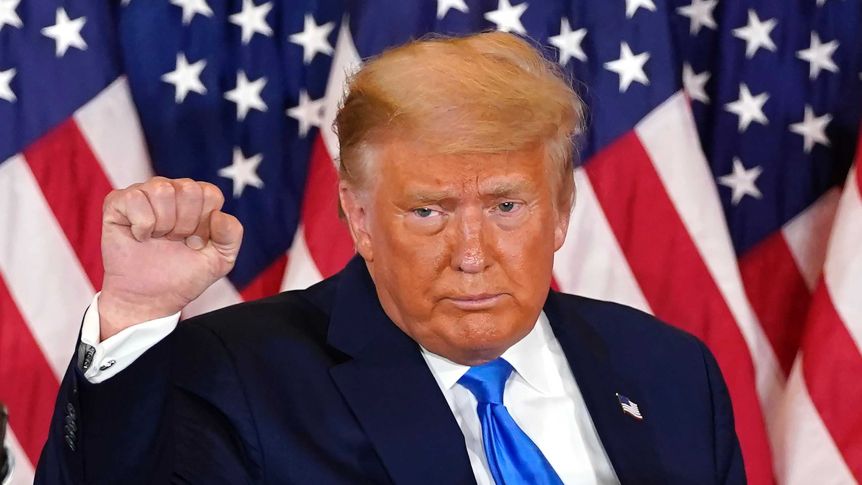
Trump accuses UK’s Labour Party of ‘foreign interference’
Donald Trump’s campaign has filed a Federal Election Commission (FEC) complaint against the UK’s Labour Party, accusing it of “blatant foreign interference” in the US election in aid of the Harris-Walz campaign.
The complaint cites media reports about contact between Labour and the Harris campaign as well as apparent volunteering efforts, arguing that this amounts to illegal “contributions”.
The BBC understands that Labour activists campaigning in the US presidential election are doing so in a personal capacity.
The Labour Party has not issued an official response.
Specifically, the complaint cites newspaper reporting that Labour-linked individuals have travelled to the US to campaign for Harris.
That reporting, the complaint alleges, creates a “reasonable inference that the Labour Party has made, and the Harris campaign has accepted, illegal foreign national contributions.”
The letter refers to Washington Post reporting that communications were exchanged between the parties and that senior officials have met in private.
Additionally, the complaint cites a social media post on LinkedIn in which a Labour staff member said that “nearly 100” current and former party members will be headed to battleground states in the US.
READ ALSO:
- Dangote’s $100m land deal: Judge, AG absence stalls court hearing
- Halima Abubakar slams AGN President with N30bn lawsuit
- Northern Nigeria suffers blackout as 330Kv circuit strips
The post, from Labour Party head of operations Sofia Patel, added that 10 “spots” are available and that “we will sort your housing”.
It appears to have since been deleted.
The complaint makes comparisons to an international programme in 2016 in which the Australian Labor Party, or ALP, sent delegates to help with Bernie Sanders’ campaign.
In that instance, however, the ALP paid for flights and daily stipends. The party and the campaign were each handed down civil penalties of $14,500.
Labour activists’ trips were not organised or funded by the party, it is understood from party officials.
Foreign nationals are permitted to serve as campaign volunteers as long as they are not compensated, according to FEC rules.
It is considered normal for party officials from the UK to be in contact with counterparts in the US.
It also has taken place previously between the UK’s Conservative Party and US Republicans.
The BBC has contacted the Harris-Walz campaign for comment.
Trump accuses UK’s Labour Party of ‘foreign interference’
BBC
International
Lebanon says four dead in Israeli strike near southern Beirut hospital
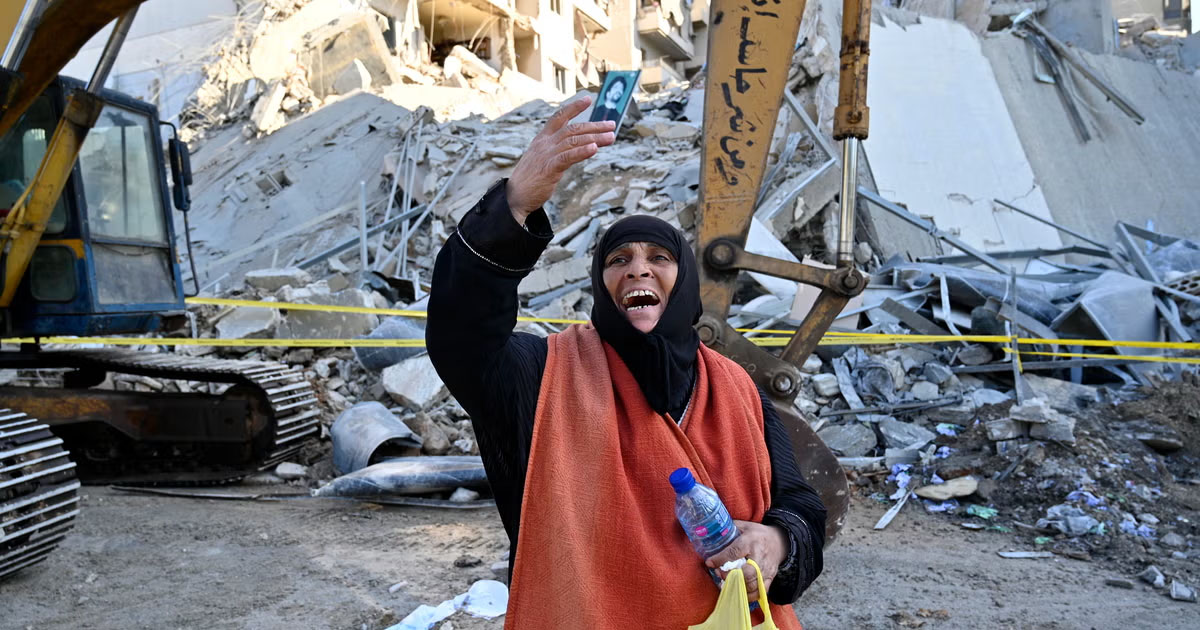
Lebanon says four dead in Israeli strike near southern Beirut hospital
Four people including a child have been killed in an Israeli air strike near the main government hospital in southern Beirut, the Lebanese health ministry says.
The strike appeared to hit the car park of the Rafik Hariri University Hospital, a hospital source told Reuters news agency. The health ministry said 24 people had been injured.
It was among 13 air strikes that hit south Beirut on Monday evening. The Israeli military said it was attacking facilities linked to Hezbollah.
An Israeli spokesman had earlier warned people to move away from several locations in southern Beirut, however Rafik Hariri hospital was not among the locations mentioned.
Videos from the Dahiyeh neighbourhood in southern Beirut, where seven locations to be targeted were announced in advance, showed locals fleeing in vehicles and on foot as the strikes began hitting.
One location identified as a target by the Israeli army was roughly 400m from Beirut airport, the only international airport serving Lebanon.
Local media shared images of some windows in an airport building that were blown in the blast.
Israel has not commented since issuing the earlier evacuation warnings.
Separately, the Israeli military said earlier on Monday that it had identified a Hezbollah bunker concealed under a different hospital in southern Beirut, which has since been evacuated.
IDF spokesman Rear Admiral Daniel Hagari said without providing evidence that the bunker under the Sahel hospital in Haret Hreik held hundreds of millions of dollars in cash and gold that was being used to fund Hezbollah’s attacks on Israel.
READ ALSO:
- Ex-president of Peru gets 20 years for corruption
- Hospitals under fire as Israeli forces deepen operations in northern Gaza
- UN chief condemns killings of civilians in Gaza
The director of Sahel hospital denied there was a bunker underneath it and called on the Lebanese army to inspect the site.
Israel appears to have expanded its war against Hezbollah beyond military infrastructure and says it is targeting the group’s financial networks.
On Sunday night Israel carried out air strikes targeting branches of a financial association linked with Hezbollah in the southern suburbs of Lebanon’s capital Beirut, as well as the south and east of the country.
The Israeli military said it targeted money held by Al-Qard Al-Hassan Association (AQAH). It offers financial services to civilians in areas where Hezbollah has strong support, but Israel and the US accuse it of being a cover for the Iran-backed group to fund its activities.
There was no immediate comment from AQAH or Hezbollah.
Also on Monday, US President Joe Biden’s special envoy to the Middle East arrived in Beirut to explore the possibility of a negotiated end to the war.
Amos Hochstein said the US wanted to see an end to the war in Lebanon end “as soon as possible”.
He said that UN resolution 1701 – which calls for the Lebanese state to be the only armed force in southern Lebanon – was “not enough” and the US was looking into what more needed to be done.
Hezbollah fighters meanwhile continued to fire rockets into northern Israel, with the military reporting that 170 projectiles had crossed the border by late Monday evening.
Israel began an intense air campaign and ground invasion against Hezbollah after almost a year of cross-border fighting sparked by the war in Gaza, saying it wanted to ensure the safe return of tens of thousands of residents of Israeli border areas displaced by rocket attacks.
Hezbollah began firing rockets into northern Israel in support of Palestinians on 8 October 2023, the day after its ally Hamas’s deadly attack on Israel.
More than 2,400 people have been killed in Lebanon since then, including 1,800 in the past five weeks, according to the country’s health ministry. Israeli authorities say 59 people have been killed in northern Israel and the occupied Golan Heights.
Lebanon says four dead in Israeli strike near southern Beirut hospital
BBC
-

 News2 days ago
News2 days agoFIRS announces recruitment of young graduates
-
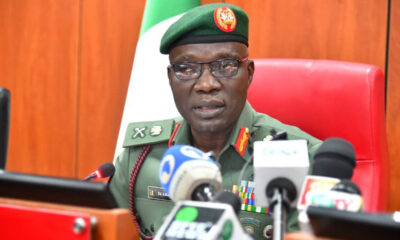
 metro3 days ago
metro3 days agoUpdated: Army says reports of COAS Lagbaja’s death fake news
-

 metro2 days ago
metro2 days agoOluwo chased me out when I visited him – Ooni (VIDEO)
-

 News3 days ago
News3 days agoOsinbajo traitor, can’t talk about integrity – Reno Omokri
-
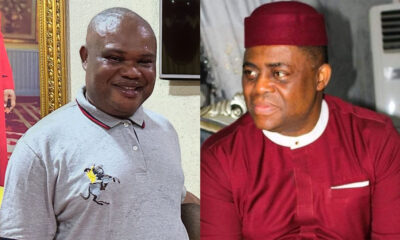
 metro3 days ago
metro3 days agoFani-Kayode: How my aide died in hotel after attending church
-

 Business1 day ago
Business1 day agoWe’re settling out of court with NNPC, others — Dangote
-

 Africa2 days ago
Africa2 days agoFamilies feared trapped as eight-storey building collapses
-

 News2 days ago
News2 days agoYou can’t overrule Supreme Court on LG autonomy – Klinsmann tells Soludo



